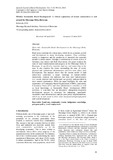Please use this identifier to cite or link to this item:
http://hdl.handle.net/10311/1319Full metadata record
| DC Field | Value | Language |
|---|---|---|
| dc.contributor.author | Kolawole, Oluwatoyin D. | - |
| dc.date.accessioned | 2014-12-11T13:33:14Z | - |
| dc.date.available | 2014-12-11T13:33:14Z | - |
| dc.date.issued | 2014 | - |
| dc.identifier.citation | Kolawole, Oluwatoyin D. (2014) Whither Sustainable Rural Development?: A critical exploration of remote communities in and around the Okavango Delta, Botswana, Spanish Journal of Rural Development,Vol. 5, No. 3, pp. 99-114 | en_US |
| dc.identifier.issn | 2172-2277 (online) | - |
| dc.identifier.issn | 2171-1216 (print) | - |
| dc.identifier.uri | http://hdl.handle.net/10311/1319 | - |
| dc.description | Article first published in Spanish Journal of Rural Development, Vol. V (3): 99-114, 2014 Copyright © 2014 Ignacio J. Díaz-Maroto Hidalgo, DOI: 10.5261/2014.GEN3.09 | en_US |
| dc.description.abstract | Rural areas constitute the critical mass, which drives economic growth and development in many developing countries. They contribute mainly to manpower and the production of industrial raw materials needed in urban centers. Through a combination of critical review of literature, case studies and field observations, this paper explores the state of rural transformation and progress in the Okavango Delta of Botswana. It specifically examines land use and tenure-ship in the area. It also explores the issues surrounding the state of social, physical and institutional infrastructures and how these affect rural development. The analysis shows that the current model of land tenure-ship constitutes a major challenge in human-wildlife interactions. Analysis also indicates that basic rural infrastructures (i.e., social, physical and institutional) are grossly underprovided in most remote communities. While the paper highlights the roles and importance of Community-Based Organizations (CBOs), particularly Community Trusts (CTs) and other administrative structures as well as local knowledge in Sustainable Rural Development (SRD) activities, it concludes that an integrative endogenous-exogenous development process is necessary for enhancing capacitated sustainable rural infrastructures and pro-poor policy implementations, which are in turn meant to drive rural entrepreneurship/employment and local development. | en_US |
| dc.language.iso | en | en_US |
| dc.publisher | Galician Association of Researchers for Rural Development, http://www.sjruraldevelopment.org (Asociación Gallega de Investigadores para el Desarrollo Rural (AGAIDERU).) | en_US |
| dc.rights | All rights reserved | en_US |
| dc.subject | Land use | en_US |
| dc.subject | Community trusts | en_US |
| dc.subject | Indigenous knowledge | en_US |
| dc.subject | Pro-poor policy | en_US |
| dc.subject | Rural employment | en_US |
| dc.title | Whither sustainable rural development?: A critical exploration of remote communities in and around the Okavango Delta, Botswana | en_US |
| dc.title.alternative | ¿Hacia dónde va el Desarrollo Rural Sostenible? Una exploración crítica de comunidades remotas en y alrededor del delta del Okavango, Botswana | en_US |
| dc.type | Published Article | en_US |
| dc.rights.holder | ©2014 Iganacio J. Diaz-Maroto Hildago | en_US |
| dc.link | DOI: 10.5261/2014.GEN3.09 | en_US |
| Appears in Collections: | Research articles (ORI) | |
Files in This Item:
| File | Description | Size | Format | |
|---|---|---|---|---|
| Whither sustainable rural development.pdf | Main article | 1.57 MB | Adobe PDF |  View/Open |
Items in DSpace are protected by copyright, with all rights reserved, unless otherwise indicated.
